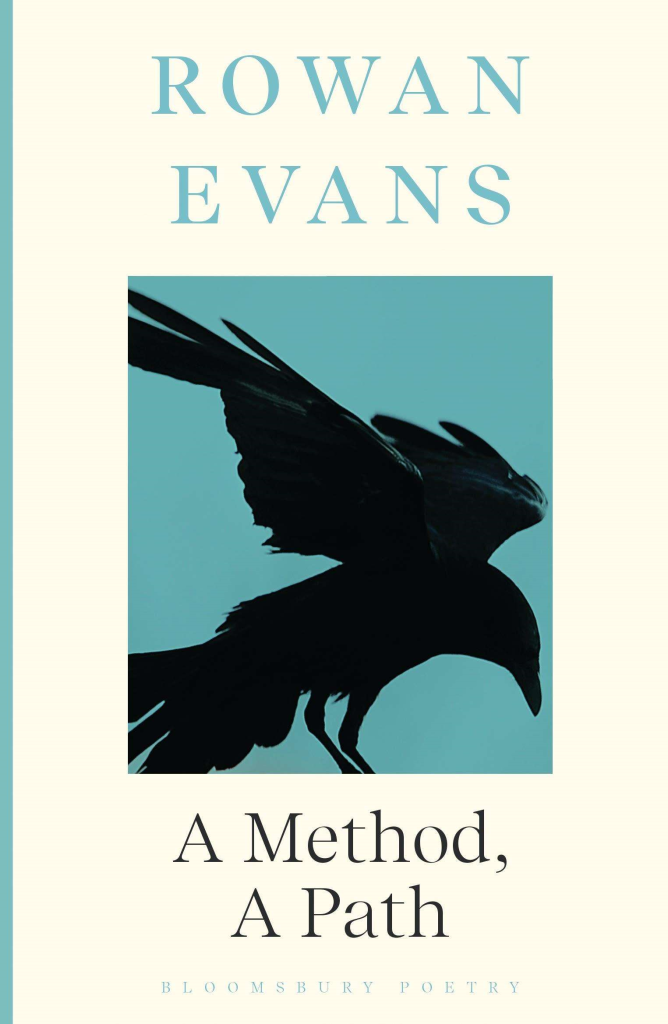A Method, A Path (Felix Dennis Prize for Best First Collection, Forward Prize 2023, Shortlisted)
Rowan Evans
(Bloomsbury Poetry, 2023; pbk, £9.99)
The Felix Dennis shortlist is drawn from first collections, previous winners include Don Paterson, Simon Armitage, Liz Berry, and Rachael Boast. What, therefore, does Rowan Evans’ first collection offer which might see the poet follow in those auspicious footprints?
The collection’s title ‘A Method, A Path’ possibly identifies its own manifesto; themes are sometimes explored across connected sequences where each poem proposes new forms with new rules. The opening sequence is ‘On Ēglond’ (from the Old English ‘on an island’). Poems swing between formally consistent stanza patterns, mirrored blocks of prose-poem and refrain-driven list-like poems. Poems in this sequence and beyond are driven by references to Anglo-Saxon myths and preoccupations through use of vocabulary and Nordic characters. This inventive formality is possibly the ‘method’ with the historical threads the ‘path’.
One might imagine that such formal and thematic ambition married with deep understanding of Old English might render the poetry dry and exclusive, but the poems are full of invention and lyrical and balladic beauty,
The poem I hold in my hand is a single island,
a stone dropped in a river eleven centuries ago.
and then, later,
Put down the stone, it is burning in your hand.
I offer it to the creature, who holds the stone in its jaws.
Whilst the focus is mainly on the centuries-long path that leads back to Evans’ Anglo-Saxon forebears, the work often diverts into conversations with Shakespeare, Lorca, Emily Dickinson, John Clare and Bashō among others. ‘Cante Jondo Mixtape’, responds to Lorca’s ‘Poema del Canto Jondo’ and Jack Spicer’s collection of translations (and impersonations) of Lorca’s work. Once again it is a sequence of shifting formal and form-less poems, but is built throughout on oblique yet pleasing passages of wordplay laced with jewels of surprise,
stand up & the world is
void then ochre then
filled with feet
yellow scraps &
incremental souths, I doubt
there’s a better calling
against empire
than violins raising tackle
to a kinky moon[.]
Whatever this might be intended to mean, the poem is undeniably rich and fertile in its choice of language.
Elsewhere there are poems such as ‘Withstances’ that speak in parallel with Anglo-Saxon to dizzying effect,
so step here so shriek this
whereas the jay its skew and wising
as an absent word of wætre of axshes
and of asking shall betoken the holy sealfe
also also eal so[.]
Particularly satisfying is ‘Notes Towards a Performance of Bird Voice’ which is built around diagrams of birdcalls, again setting up conversations between modern and Old English to show how the more ancient form of our shared tongue still speaks in our day-to-day lives—even in the trills and whoops of bird life. The poem ‘Riddle’ does indeed offer itself as a riddle, again, in contact with the vernacular, but containing those birdlike whoops and trills in delivering an unsolved (and possibly insoluble) conundrum of its own making:
Saw a mark on the sky-glow
heard a skirr in the up-sound
skrim-like
hunger-like
tall-as-shadow
dim-as-tower[.]
This poem, among others, presents itself in sound as well as image. The collection makes extensive use of expressive sonic fragments, mostly from the natural world but occasionally in the form of distant or overheard voices. It comes as no surprise, therefore, to read that the author is also a composer and sound designer.
This is a collection of poems marrying ambition with erudition, setting out a way of speaking from the past to the page present, using a variety of tongues, registers and forms. It perhaps seeks to preserve the language, changed since Anglo-Saxon times, through exploration of things which the language cannot change—landscape and seascape, birdsong and beast-song, stone and sky. Poems are consistently complex and challenging and not always comfortable on the eye, ear or tongue, but the work is always engaging and explorative, and packed with ideas. It is a testament to the Felix Dennis panel that esoteric and scholarly work such as this finds a place on the prestigious short list.
Andy Jackson


Leave a Reply